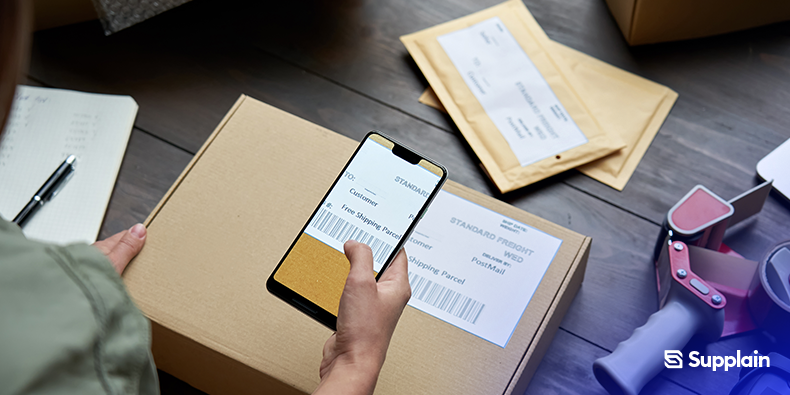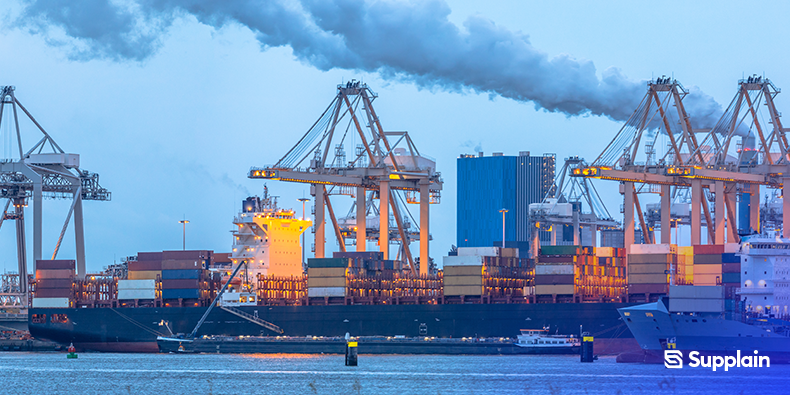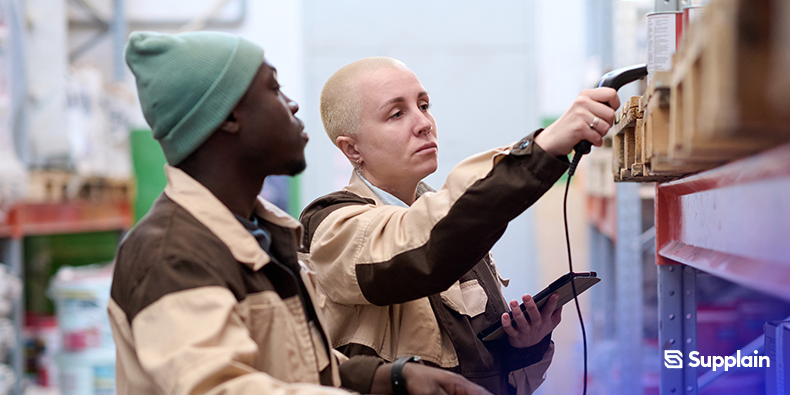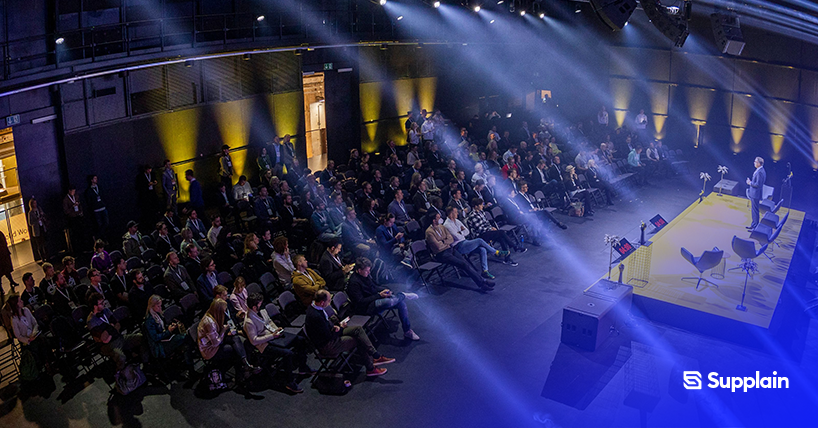
Research has indicated that there are 4,160 parcels shipped every second, with volume expected to double to 266 billion in 2026. In 2021 there were colossal supply chain disruptions caused by interoperability and closure of shipping lines. Combined with the COVID-19 pandemic and war and conflict occurring worldwide, it is evident that supply chains are under strain.
One solution muted to increase supply chain interoperability between stakeholders is NFTs in blockchain-related technology. Blockchain technology has massive potential for supply chain, eCommerce and logistics, ensuring accurate traceability control.
NFTs contain digital data that is immutable and thus make it possible to uniquely identify products with their owners and include specific additional details.
Nobody can manipulate this information, and trust is strengthened among every supply chain party, from manufacturers to last-mile deliveries.
Blockchain technology is a popular use case for supply chains because it provides an entire record of all the supply chain phases a product undergoes, which is critical for supply chain businesses in the food and health industries.
Currently, NFTs are primarily used to create collectables in games and sports, buy and sell digital art, and collect music royalties. They show overall innovativeness, but does it make sense to use NFTs in other business scenarios?
And why is an NFT different from other tokens? This article explores the base practical applications for NFTs, especially in supply chains.
Why is the NFT supply chain a solution?

Instead of long, extensive, complex paper trails that go along with transactional ownership and activity of various items, NFTs create a digital 'token ID' that attaches to that item throughout its entire lifespan. The uniqueness of each NFT is defined explicitly by the data stored within the NFT's metadata. The metadata itself is updated and stored on a blockchain in real-time.
For supply chain stakeholders, NFTs enable them to access the same immutable record on the digital ledger, reducing and most likely eliminating discrepancies in information data flow between stakeholders.
The immutability and transparency features of blockchain technology guarantee the authenticity and reliability of data in supply chains. It is why many supply chain blockchain technology companies have flourished.
NFTs increase efficiencies and reduce costs incurred when goods are accrued and sourced- they produce data at every step of the supply chain with its location, quantity, what's inside, VAT, customs and other helpful information that can be monitored through each step if required.
Eradicating today's supply chain problems using NFTs

A delay in only one part of the supply chain results in pausing the remaining sectors for the journey of a product. For instance, cars have hundreds if not thousands of parts worldwide in the automotive manufacturing industry. Suppose one of those items is missing, whether it's an oil filter or a complex dashboard touchscreen. In that case, the vehicle can't be completed, and the production facility grinds to a halt.
Because NFTs create a digital twin for any item (from car seats to engine parts), the item's real-world metadata, its unique identity, current location, responsible party, possession, container temperature, and other metrics to be attached to it – garnering valuable insights about its condition, location or delivery data.
This metadata is automatically updated on the blockchain as conditions change, provided all parties agree to the change. For instance, if customs have been paid, all must agree it has been paid. If a part is not added, the manufacturer will source alternative options from another location to keep the supply chain flowing.
Supply chain trends have seen several organisations have already started using blockchain for tracing their product's journey through the supply chain from its origin to the consumer.
Supply chain stakeholders are utilising the NFT-blockchain framework to leverage its uniqueness in tracing assets to demonstrate tracking and stopping counterfeited products from entering the market.
This means that buyers can individually authenticate all products they purchased, whether they are genuine, and what they have paid. Furthermore, they can track their product through the supply chain.
Supply chain NFT technology - is it workable?

Although NFT supply chain technology is still in the experimental stage, and specific applications in the industry are still being explored, blockchain NFT solutions geared towards supply chain, eCommerce and logistics have already begun.
Companies like Supplain are creating digital twins to update the data in the NFT, storing it in a blockchain protocol as the product advances along each supply chain step. As detailed above, when goods arrive at their destination, supply chain stakeholders can access a reliable, detailed history of the entire product journey, from its origin to the minute it's delivered.
If we relate the existing use cases of NFTs to the domain of supply chains. The question arises which unique assets can we represent by tokens, and when does it make sense to make these tokens non-fungible?
The following list includes some of the assets that an NFT can represent to clarify their exchange or ownership history.
1. Product authenticity
Product authenticity and provenance is a famous use case of blockchain technology. In many industries, blockchain and tokenisation are applied to track products such as food, medicines or fashion items. Tokens track the facilitation, buying and movement of consumer goods through a supply chain. By creating NFTs in the form of a product digital twin or product batches, assets can contain a unique identifier of the physical product.
2. Tracking and traceability of assets
When working with food, healthcare products, chemicals or perishable goods, it's essential to know what manufacturing and logistics process the items have gone through. End consumers need to know for how long they have been in transit, where they have been (environmental factors) and be traceable in real-time.
3. Increased data security
The data transfer between various supply chain parties is exceptionally secure. NFT metadata is stored in a blockchain protocol as a smart contract, preventing the information entered from being removed, amended or reproduced without authorisation.
4. Unique digital business documents
Business documents, including certifications, invoices and sales orders, always contain a unique identifier. NTFs can also represent these types of documents.
5. Responsibility for asset
Knowing which supply chain party is responsible in the various stages across the supply chain is imperative to facilitate a smooth, flowing supply chain. Is the manufacturer responsible? Are customs responsible or the last-mile delivery company? With NFTs, all parties can determine who's in charge of a product at any time. In addition, to issue an NFT, both parties must enter into a liability agreement. In other words, an NFT can't be sent if the counterparty doesn't agree to receive it, just as the counterparty won't deliver the goods if the responsible party hasn't received the NFT.
Simply put, the principal advantage of NFT supply chain technology in logistics is security, interoperability and transparency when transferring data between all supply chain parties concerning a specific product.
Supply chain NFT uses

From luxury goods to healthcare, NFTs' traits of transparency and immutability are still appealing and effective. Take healthcare manufacturing, for example. Blockchain NFTs can eradicate counterfeit and scam pharmaceutical products by verifying their genuineness and ensuring the correct people get their medication.
Whilst users can use the technology to identify fake prescriptions. It also can be deployed as a method for customers to visibly identify the conditions of each pharmaceutical product on its supply chain journey, including:
- storage locations,
- environmental factors (temperatures and humidity)
- VAT/ customs, if applicable and
- storage duration
- patient data
- use by date of the medicine
Looking at the list above, we see several use cases already facilitated by blockchain-based tokens. For example, tokens are already being used for a few years to trace a product back to its origin in food traceability systems.
Another use case is the luxury goods market. Companies have teamed up to protect consumers from unknowingly buying high-end goods. Brands provide a corresponding unique NFT that contains the metadata with the following information:
- the product's origins
- information about the manufacturing process
- delivery information
- VAT/customs data
We already used NFTs, but the term has found its way into the mainstream now, and we can call it what it is: an NFT, which can trace a unique asset.
You could argue that the NFT is a slightly different token implementation that enables you to create a unique digital token for each unique underlying asset, which was not possible before using ERC-20 tokens (An ERC20 token is a standard used for creating and issuing smart contracts on the Ethereum blockchain).
Will NFT supply chain use cases increase?
The short answer is yes.
It certainly makes sense to use NFTs to track (digital) assets, especially when it is required to represent unique assets. Tokenised assets in supply chains have moved from being in the realm of cryptocurrency to an industry niche term.
Though, the implementation of the tokens is a bit different from ERC-20 tokens. It highly depends on the use case which token standard should be used. Still, the existing tokens used in traceability use cases and tokens representing business documents will be replaced by NFT-based implementations.
NFTs will positively disrupt the supply chain industry by efficiently eradicating the pain points resulting in massive disruptions caused by war, pandemics and supply chain delays.
When all stakeholders in a particular supply chain operate off a 'single source of trust,' users can avoid discrepancies, mismanagement and miscommunication. The secure sharing of data and seamless integration within supply chain stakeholders (all enabled by supply chain NFT technology) are already being deployed by forward-thinking companies that understand what's at stake.
Further deployment of NFTs (coupled with artificial intelligence) in this industry will help avoid catastrophes like supply chain disruptions, pandemics and war as occurred in 2021 and this year.

![Here are the best NFT games [Updated List]](https://strapi.supplain.io/uploads/What_is_so_special_about_a_World_of_Freight_NFT_and_what_will_move_the_project_forward_b89946b520.png)
